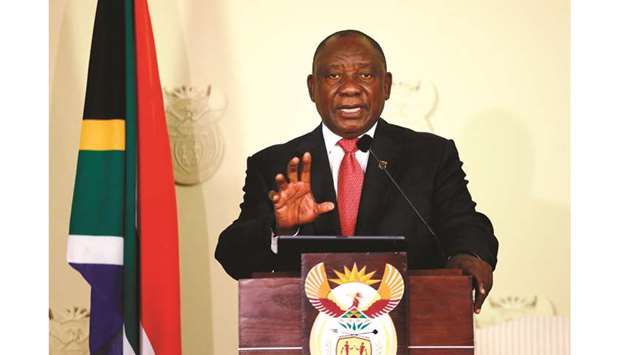South African President Cyril Ramaphosa took a step toward putting Africa’s most industrialised economy on a growth path and fighting graft by naming a slimmed-down cabinet that retained Finance Minister Tito Mboweni and Public Enterprises Minister Pravin Gordhan in their posts.
The reappointment of David Mabuza, who’s been implicated in a string of scandals, as his deputy reflects the political trade-offs he’s had to make due to his tenuous hold on the deeply divided ruling African National Congress. Since securing a five-year term when the ANC won a parliamentary majority on May 8, Ramaphosa, 66, has vowed to clean up a government discredited under his predecessor, Jacob Zuma.
“He really tried cleaning up,” said Sethulego Matebesi, a political analyst at the University of the Free State. “He has done extremely well under the circumstances. This is a team that will give us a new sense of hope.”
The new executive comprises 28 ministers, from 36 previously. The mineral resources and energy ministries were combined and will fall under Gwede Mantashe, who previously held the mining portfolio and had helped heal a rift with the industry. There was no place for Jeff Radebe, the longest-serving cabinet minister, who had headed the energy portfolio.
New faces included Jackson Mthembu, the ANC’s former chief whip in Parliament, as a minister in the presidency, lawyer Ronald Lamola as minister of justice and correctional services, and Patricia de Lille, the former mayor of Cape Town and leader of the opposition Good party, as public works minister.
Mabuza faced accusations that he helped rig state tenders and had his opponents silenced and even assassinated while he was premier of the eastern Mpumalanga province - allegations that were described in a New York Times expose last year.
Mabuza denies wrongdoing and has never been charged and was cleared of wrongdoing by the ANC’s integrity committee.
Ramaphosa initially favored Naledi Pandor or Lindiwe Sisulu to be his deputy, but gave the post to Mabuza, who won the deputy leadership of the ruling party in December 2017 and helped him secure the top post. Sisulu was named minister of human settlements, water and sanitation, while Pandor, formerly the minister of higher education, took over from Sisulu as minister of international relations.
Mabuza may be less of a threat to Ramaphosa as deputy president than he would have been had he ended up angry or frustrated in a full-time ANC position, said Susan Booysen, director of research at the Johannesburg-based Mapungubwe Institute for Strategic Reflection.
“Ramaphosa can only perform his cleanup if he’s not sabotaged by own party,” she said. “This is an intricate balancing act.”
Ramaphosa did replace Bathabile Dlamini, the head of the ANC’s women’s league and former women’s minister, after the nation’s highest court accused her of perjury. Nomvula Mokonyane, previously the environment minister who was accused in a judicial probe of taking bribes, also didn’t make the cut. Both women deny wrongdoing.
Finance Minister Mboweni, a former central bank governor, kept his position, despite opposition from the ANC’s powerful labour union allies that object to his support for selling off some loss-making state companies and spending reductions. His deputy is David Masondo.
In a nod to the unions, Ramaphosa named Ebrahim Patel, an ex-union leader as minister of trade, industry and economic development even though he never secured election as a lawmaker.
Ramaphosa was named president in February last year when the ANC forced Zuma to step down after a scandal-marred rule that lasted almost nine years. He initially retained a number of Zuma-appointed ministers, saying the cabinet was a holding one until after he secured his own mandate in the elections.
“Ramaphosa appointed almost all his own people into cabinet,” said Melanie Verwoerd, an independent political analyst and former ANC lawmaker. “I believe he has stamped his authority on it.”

South African President Cyril Ramaphosa announces the composition of the national executive at the Union Buildings in Pretoria, South Africa on Wednesday.
